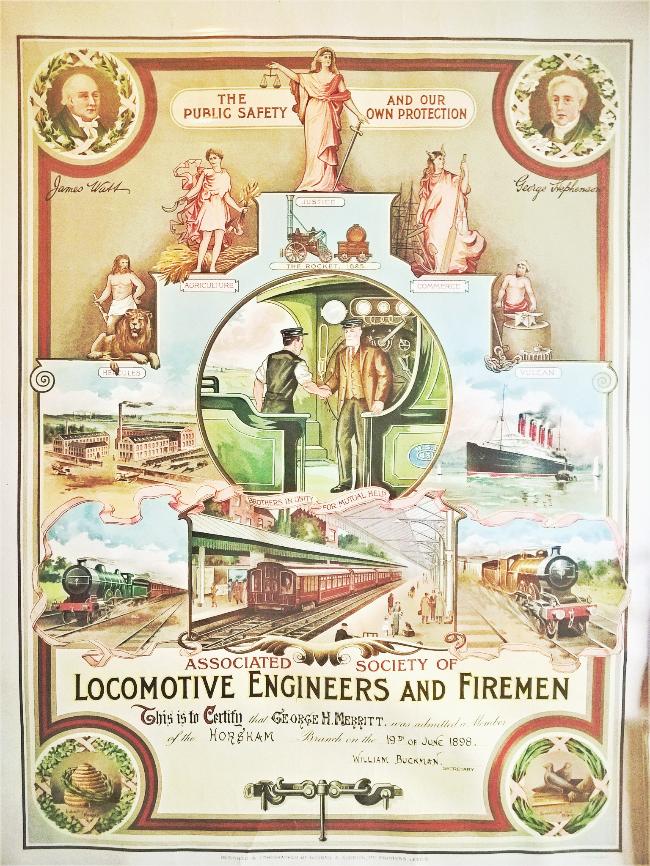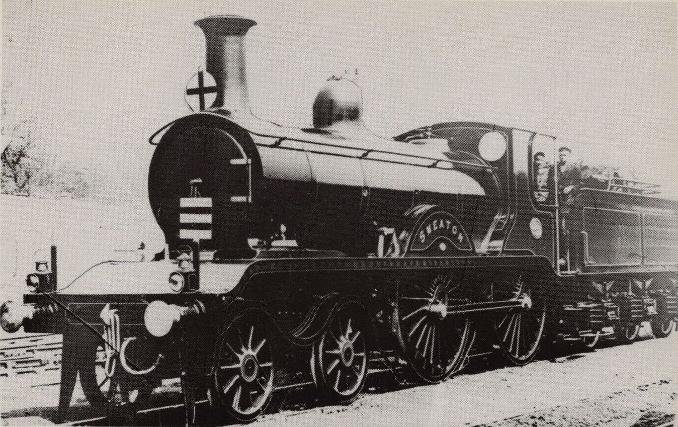
LOCOMOTIVE JOURNAL
1898
HORSHAM BRANCH
OPENING OF A NEW BRANCH AT
HORSHAM SUSSEX
Sir, -- On Sunday, April 24, some of our friends from Battersea, journeyed down here for the purpose of addressing a meeting of enginemen and firemen, and to open a branch of our Society. There was a attendance, considering this is only a small depot. With a few transfers we started a branch with 21 members, and before long we shall have more. Mr. Perkins, of Battersea, was voted to the chair, and the meeting was addressed by Messrs. G. Mannell, W. Cooper, and J. Bliss, who pointed out why enginemen and firemen should mind their own business and not ask others to do what they could do for themselves. You will hear more from us soon.
Yours fraternally,
BRANCH SECRETARY

LOCOMOTIVE JOURNAL
1898
Sir,-- In connection with the recent concessions granted by the L. B. & S. C. Railway through our overtures I beg to claim the indulgence of publicity to the jealous - unmanly - and slanderous statements put forward in the R.R. - that the deputation of which waited on Sir Allen Sarle was of a purely personal character and had no official basis. That, of course, is a direct lie, as we never waited upon Sir Allen Sarle. Had the report been confined to the R.R. there would have been no need of replying to it, but the statements have been circulated, and have excited comment, hence my desire to deny such wilful misrepresentations. You know, Mr. Editor, that Mr. W. Young, Brighton, Mr. J. Pogmore, New Cross, and myself Battersea, were elected by the members and approved by our E. C., and you, being the chairman of a large open meeting when I gave the report of an interview with our superintendent, I the got a unanimous vote of confidence. A newspaper supported by railwaymen, and guilty of such spiteful vapourings, should be treated, as it deserves, with contempt by the enginemen and firemen of the whole country. Wishing you and the whole your readers a Happy New Year.
Yours Fraternally
J. M. Bliss
BATTERSEA BRANCH
BATTERSEA BRANCH
E.C. Member 1903 - 1906
THE
'BRIGHTON LIMITED'
PULLMAN

On 2nd October, 1898 the Sunday ‘Pullman Limited Express’ commenced operating,
consisting of five coaches. The new train left Victoria at 11 a.m. and returned from Brighton
at 9 p.m. It ran only on Sundays, and not at all during July, August and September, by reason of the difficulty of securing a clear road in the holiday months. During June the train left Brighton an hour later. Like its predecessor, it was at first called “ The Pullman Limited
Express.” In 1899 the name of the train was called ‘Brighton Limited’, began to be used, but not to the exclusion of the earlier one, which retained until 1908, when it was superseded.
From the outset this train was the first to be timed to run from Victoria to Brighton in n hour,
and to do the same on the return journey.
At this period the L.B. S.C.R. was anxious to clear itself of its long-standing reputation for
dilatoriness, caused partly by traffic congestion on the main line north of Redhill, and some
very fast runs were made with the lightly loaded Pullman Limited on Sundays, when the track was relatively clear. This train was timed to cover the 50 ¾ miles between Victoria and
Brighton in each direction in exactly sixty minutes, and in the coming years the new engines
could cut several minutes of the schedule.
On the opening run, hauled by the new B2 class 4-4-0 express no.206, Smeaton, the down
journey was made in 59 minutes 9 seconds, and the return trip in 58 minutes an 57 seconds.
The following week the up journey was made by No.213, Bessemer, in 57 minutes 57 seconds.
These locomotives had been built by Mr. R.J. Billinton who was the successor to William
Stroudley, to cope with the increasing weight of traffic, and the old Stroudley drivers, who
were a race apart, took it very hard when they were taken off the fastest main line trans. In
actual fact the ew engines proved, if anything, to be rather less efficient than their
predecessors, and in the not uncommon event of a B2 failing under the load there was
inevitably a good a deal of vigorous back chat flying about when a Stroudley had to come to
the rescue. Subsequently all the B2 class were rebuilt, but they never quite came up to the best Brighton standards and were scrapped in the 1930s. while the old Stroudley expresses in Southern livery could still be found working main line excursions and other jobs nearly forty after they had officially been displaced.
THE RAILWAY REVIEW
25TH NOVEMBER 1898
THE RAILWAY REVIEW
23RD DECEMBER 1898
THE PLAINE RAILWAY FAMILY OF BRIGHTON
The Plaine family had a railway connections in Brighton since the 1860s, whereby nearly
every male member of the Plaine family worked up until the retirement of Phil Plaine in
1989.
Arthur W. Plaine, footplate seniority was 23rd May, 1898, left the footplate and transferred to the C.M.E. Department according to the Southern Railway magazine in Jan/Feb1942 (page 26).
Walter Plaine (William Plaine’s brother) entered the footplate grades at Brighton on the 29th April,1901.
William Charles Plaine (Walter Plaine’s brother) entered the footplate at Brighton on the
26th October, 1914. From 1937 - 1941, William served has the A.S.L.E.F. Branch Secretary,
for the Brighton No.1 Branch. In 1949 he transferred to the Motorman’s depot (Brighton/West Worthing) and appears in the A.S.L.E.F. Brighton No.2 Branch subscription book in the March quarter of that year. There is no clear indication of which of the two Motormen’s depots he was at/or which depot/branch he was prior to his transferred.
It is thought that he had transferred from the Brighton steam depot (A.S.L.E.F. Brighton No. 1 Branch). William remained a member of Brighton No.2 until his retirement in 1962. The last ASLEF contribution was made in the June quarter of 1962 and he therefore retired shortly after this date.
George E. Plaine, footplate seniority was 31st August, 1917 and transferred to as a Fireman
at Brighton to a Fireman at New Cross along with a large number of fireman on Monday 2nd January, 1933, this would probably have been caused by the electrification of the Brighton main line. He later became a “Passed Man” at New Cross on the 25th September, 1940.
Philip Plaine (Walter Plaine’s son) entered the fooplate grades at Brighton on the 11th October, 1943, transfers to Brighton Motormen’s depot in c1960 and retired in 1989.
TROCCO PLAINE
I am trying to find out which one of the two senior members of the Plaine family was given this nickname, because when he first started at Brighton as an engine cleaner, he was a regular engine cleaner on Stoudley’s E-tank No. 118 'Trocadero'. When his son (either George or William or Walter ) started at Brighton has an engine cleaner, he too was known has ‘ Trocco’. By this time ‘ Trocco Senior’ was already a driver at Brighton.
* Information gathered from
Neal Cowdrey, Jennifer Chapman (Phil Plane’s daughter) & Fred Rich’s book ‘Yesterday Once More’